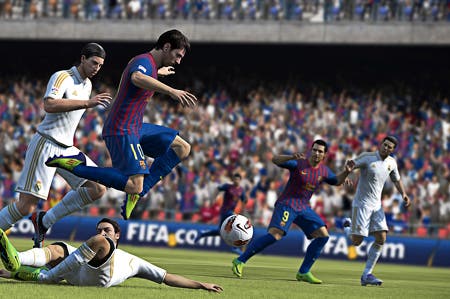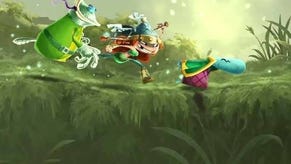FIFA 13 Preview: A Final Flourish?
EA Sports offers a conservative update with its latest FIFA.
It's not over until it's over, as those in pale blue who left the Etihad Stadium before full-time on Sunday found out to their own eternal embarrassment. This year's Premier League has seen the title move from one side of Manchester to another, a seismic shift that some five years ago would have seemed improbable.
This console generation's battle of the football titans has, at times, felt equally dramatic, as full of fumbles and moments of flair as anything the Premier League has offered up in the last nine months. It started with Konami's Pro Evolution Soccer as champion elect, but now looks set to end with FIFA in a position of unquestionable supremacy.
"It's been an amazing journey. I think it's been the most exciting journey that I've ever been on. But it's come with plenty of sleepless nights," says EA Sports' executive vice president Andrew Wilson, a fast-talking Australian who's the embodiment of corporate cool.
"We rewrote the engine for FIFA 07, so FIFA 06 was the last game on the old engine. And it was not well-received, as anyone who was around then knew. We were coming into a market where the community didn't really have a lot of respect for what we did, so we knew we'd have to face a challenge to win back the hearts and minds of football gamers."
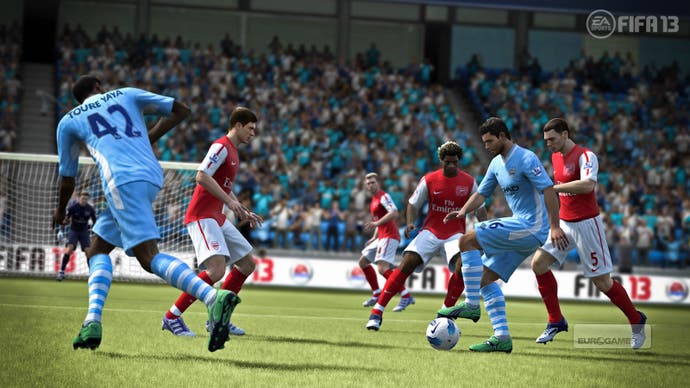
FIFA started this generation with a Metacritic of 62 - a figure that seems generous in light of our damning 2/10 review of FIFA 06 - but FIFA 07 saw the start of a sharp, steady incline. The series peaked with last year's FIFA 12 and its flat 90 rating.
"It's a challenging place to be," admits David Rutter, line producer and for many the face behind this generation's FIFA. "You're always trying to outdo the previous game."
After last year's effort, one that introduced the Impact Engine and Tactical Defending and changed the face of the soccer sim in the process, that's a harder task than ever before. "Certainly at the end of it we were worried how we'd top it," says Rutter. "But you watch a lot of football and it's clear that there's stuff that we haven't picked up, or we haven't got quite right."
During a lengthy presentation, Rutter and his team outline their vision for FIFA 13, an outing that is clearly more refinement than revolution, and one that's all about ironing out the kinks in systems like the Impact Engine and Tactical Defending.
Initially it's easy to be blinded by the science and difficult to put a finger on exactly what has changed. "It's about creating a true battle for possession plus delivering the freedom for creativity," says line producer Nick Channon. "It's about equalling the unpredictability of real-world football."
So FIFA 13's improvements are holistic rather than headline-grabbing, although they are in fairness plentiful. There's an emphasis on more creative play, introduced to counteract the more nuanced defending in FIFA 12, and it's a fact underlined by a new feature: Attacking Intelligence. This is, to put it drily, new positioning code that improves how players analyse space and subsequently make runs. In practice it's a feature that's evidently been inspired by the fluid attacks of Barcelona and Manchester United.
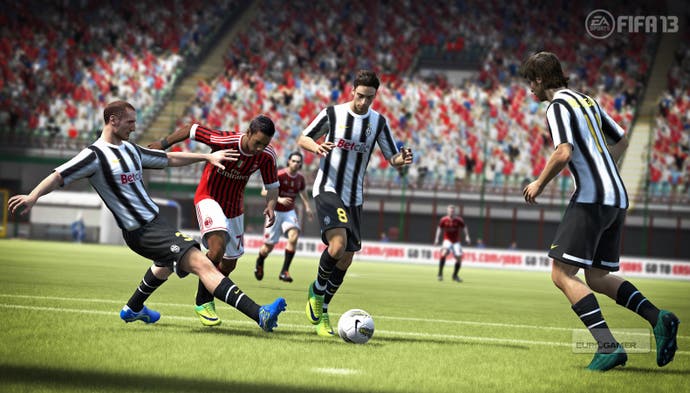
Barcelona's influence is felt elsewhere with the implementation of Complete Dribbling, a feature that places an emphasis on one-on-one encounters that's inspired by - who else - Lionel Messi. The introduction of 360-degree dribbling in FIFA 10 was one of the series' biggest innovations, and EA Sports hopes this feature will have a similar impact.
Previously, players would face in the direction of their runs, but with Complete Dribbling it's now possible to dance around the ball, facing the goal at all times. There's even a little influence from the pleasantly entertaining FIFA Street reboot, which is noticeable when Cristiano Ronaldo sees off a defender with a flurry of flicks and feints. "It was originally called strafe dribbling," Rutter later explains. "But obviously that's got its own connotations from a different genre. It's totally mimicking the way that real football players dribble."
While Complete Dribbling adds another layer of control, FIFA 13's other introduction wrestles some of that away. First Touch Control reins in the improbable grace with which players would bring down a high ball, and adds a more random element with the first touch.
The ball can pop up a little and is liable to move around more, and the efficiency with which it's brought under control is now more influenced by the skill of the player being controlled. This doesn't necessarily mean you'll be losing control all the time, though; sometimes the movement works in your favour more than a perfectly controlled touch would.
Right now it seems an odd feature to highlight, and there's a slight sense of déjà vu; Personality Plus, a feature introduced in FIFA 11, promised a similar, more random element that would place an emphasis on player attributes. There's also a telling difference in philosophy compared to PES 2013's alternative take on the same thing, Dynamic First Touch, which allows players to stop high balls dead and to flick them past defenders, an approach that, potentially, sounds more entertaining.
The last of FIFA 13's additions is similarly hard to gauge. Tactical Free Kicks allow you to place up to three players on the ball, and gives players on both sides more control of the situation. Walls can be more accurately positioned (it's possible to inch a wall forward, too, although doing it excessively will result in a booking) and players can be sent rushing forward to block the ball.
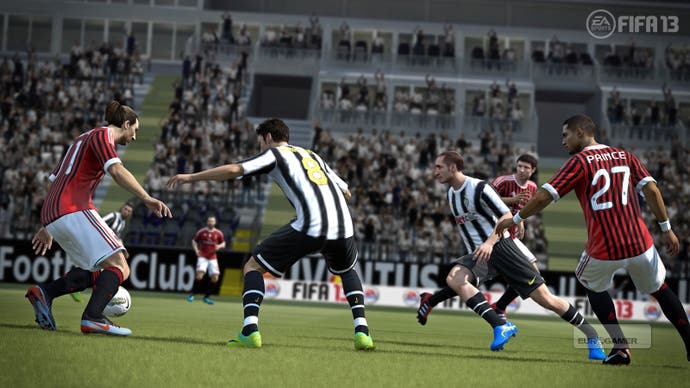
If FIFA 13's improvements sound a little underwhelming at first, then that's likely because FIFA 12 was so impressive, and quite likely the best football game this generation has seen to date. It certainly wasn't perfect, however, and FIFA 13's working to resolve some of the more notable problems with its predecessor.
In fact, the earlier assertion that there's no real headline feature in FIFA 13 yet isn't exactly true, because if there's one thing to come away with then it's the wealth of improvements that are being made to the Impact Engine. Or, in short, FIFA 13's big new thing is No More Kissing.
Some of the more notable bugs that plagued FIFA 12 - for better and for worse - have been ironed out, and the Impact Engine's been expanded to have more influence over a match. There's an increased element of push and pull when defenders come up against attackers, and a defender's weight will now have more bearing on a situation, so if a player as stacked as Rio Ferdinand is harassing a more diminutive striker then it's possible that the striker will be forced off-balance and subsequently fluff their shot.
Off-the-ball battles are also more pronounced, and defenders are now more liable to get their body in the way of an attacking run, blocking it off. The referees, meanwhile, have been altered in order to keep on top of the new possibilities that the refined Impact Engine offers.
Even EA admits that this is a less dynamic year, the developers do of course assure us that each small change has its own major impact. "It's an interesting one," says Rutter. "There were some very big changes last year, and they were very easy to summarise as these three big features.
"This year there are some equally big game-changing things in there - First Touch Control and the Complete Dribbling are for me the two very big changes that people will notice - [and] they in and of themselves are probably bigger. One is bigger than Precision Dribbling, for sure, and First Touch Control is probably about the same amount of difference to the game as Tactical Defending. The Impact Engine was a genre-defining moment in video games - the stuff that we're doing around that is probably not quite so revolutionary but it's certainly a big deal."
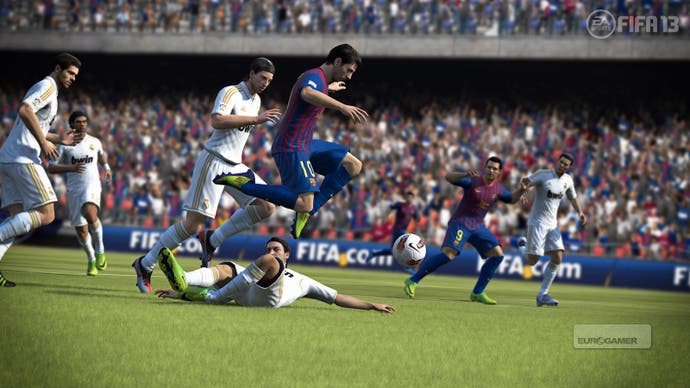
There are other additions to FIFA 13 that are likely to be a big deal, but as is the way with protracted PR plans they won't be making themselves known until the big trade shows roll around. First there's the implementation of Kinect, a first for the series that was announced at E3 last year. "Yes, we've figured out a way to get it in there," says Rutter. "We'll be showing it off later this year. I'm happy with how it's worked out. When it was announced at E3 last year, everyone was concerned but we said we'd do right by the franchise and I feel that we have."
And there's still news to come on improvements on EA Sports Football Club, the social side of FIFA that, judging from Andrew Wilson's stance, is paramount to the future of the series. "The relationship you have with your club is the most important in your life, aside from your family," he says somewhat dramatically at the start of the presentation, before going on to explains his thoughts further later on.
"I think the expectation for games in the future is for a game that changes as you play, and I can access that gaming experience from any piece of hardware that I've got at the time," he says. "If I've got my phone on me I'll be able to play - maybe that's me managing my Career mode or my Ultimate Team - and if I'm on Facebook maybe I'm doing things there. It's this notion that I'm never away from my experience, and I'm never wasting time. Playing games on my mobile phone is no longer wasting time - it's contributing to my FIFA world."
How that vision plays out in FIFA 13 remains to be seen, and it'll likely nestle within a game that in its journey to supremacy has arguably earned the right to be complacent. With Konami's Pro Evolution Soccer 2013 shaping up on the other side of the world in what looks to be a promising year for FIFA's rival, however, we'd be fools to leave this particular contest until the final whistle blows.
